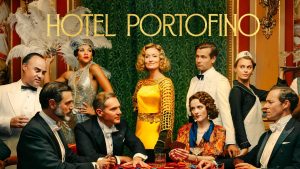In Season 3 of HOTEL PORTOFINO, airing Sunday nights on PBS, it is 1929. Fascism is rising in Europe and the stock market crash is looming. Both of these factors will impact Bella Ainsworth (Natascha McElhone) and her estranged husband Cecil (Mark Umbers), Britons who own the title establishment on Italy’s Amalfi Coast.
Matt Baker, originally from Yorkshire, England, created HOTEL PORTOFINO and has written all the episodes. Baker was also the primary writer on the series BEFORE WE DIE, and done scripts for the series SUSPECT and PROFESSOR T, and the upcoming PATIENCE. He gets on a Zoom call to talk about all things HOTEL PORTOFINO with Assignment X.
Baker says he came up with the idea for the show “during the second COVID lockdown [in England] during the pandemic. It was during the autumn of 2020, and it was part of a conversation I had with Jo McGrath and Walter Iuzzolino, who are the [executive producers and] principals of Eagle Eye Drama, who produce the series.
“Walter’s a native of Liguria, and knows the coast around Portofino very well, and Jo had been with him to the Ligurian Film Festival, which was staged in Portofino. They both loved the location, and wanted to come up with a period drama set in that location. And that was the start of a conversation which went through several stages, and ended up with a brief for me to come up with an idea that would be based in Portofino, it would be set between the Wars, and would be focused around the idea of a British family in a hotel, and we took it from there.”
More specifically, Baker continues, “We wanted the confluence of Italian culture and cuisine and the climate, and the effect it has on the British character, the sort of stiff upper lip nature of British people at the time, and that was what we were trying to capture.”
Baker and the producers did not start with a long-term arc for HOTEL PORTOFINO. “There may be genius writers and producers out there who start Season 1 with an arc all the way through to the end of Season 7 or 8 or 10 or whatever. I didn’t start there. I think we always knew it had the potential to move it forward chronologically, and to follow the family and to see how the story developed, but we didn’t have a long-term narrative arc in mind when we started writing and filming Season 1. So, when we got to the end of Season 1, and we started on Season 2, it was a process – there were plenty of open-ended storylines that we could adjust and play with. It wasn’t set in stone.
“We didn’t set off with a three-season plan, we set off with a plan to explore the hotel and the impact it was having on Cecil and Bella’s relationship across one season, and then, obviously, as we built across Season 1, we left open storylines to be explored further if we were lucky enough to get a re-commission, and happily, we’re now on Season 3.”
Baker had affinity for the 1920s even before embarking on writing HOTEL PORTOFINO. “I’ve sometimes given this answer before, and my sisters, who come from the same place as I do, a little town in Yorkshire, laugh at me, but I think the world I grew up in, in England – I was born in the late 1960s and went to school in the early 1970s and ‘80s – was still very influenced by aspects of Edwardian culture. That sounds weird, but it’s true. I went to a boys’ school, and a lot of the language that was used was still of that era. A lot of the way things were taught, a lot of aspects of culture, were still quite prevalent in the culture of Britain that I grew up in. So, it feels familiar to me, and when I’ve read literature from that time, whether it’s ENCHANTED APRIL or [E.M.] Forster’s A ROOM WITH A VIEW, that kind of stuff, it doesn’t feel like it’s ancient history, the characters feel quite close to the world I grew up in. So, I do think there is an affinity there.
“The other thing I would say is, it’s such an evocative, exciting period. It’s a period of transition between almost one age and another. The first World War was such an enormous shock to the establishment, and to the way of the world, and to religion, and gender, and all these aspects were slightly thrown up in the air by it. Out of that came a release of new behaviors, new technology, new aspects of culture, and a changing dynamic and hierarchy within society. So, it’s just a very interesting period to write about. And obviously, without belaboring the point, there are some interesting parallels between that world, and how it was emerging then, and the world we’re in now in terms of politics.”
Baker began doing what he calls “desk research, trying to find out what British ex-pats might be doing in Italy at that time, and the characters just sort of emerged from that, really. Obviously, the types of characters that have the financial wherewithal in the 1920s to be able to live that kind of lifestyle that probably would come from either a moneyed or an aristocratic background. That was the canvas on which I started to write.”
There was one big advantage available to Baker as a dramatist that had been denied to his predecessors: the Internet. “I think the great thing about writing at this time in our development is that you’ve got the whole world at your fingertips,” he laughs. “So, I’m constantly researching as I write. Half my day is probably looking something up online, or reading through an archive. I didn’t sit down and do three months of research before I started to write. I researched as I went along.”
Traditional materials also aided Baker’s research. “I have read various books that informed my view of Italy, THE ITALIANS by John Hooper, who’s a former correspondent for the FINANCIAL TIMES in Rome, about the Italian culture and people, which was very helpful. My son happened to be studying modern Italy in his history class at school, so I nicked one of his textbooks, a history of modern Italy [MODERN ITALY, 1871 TO THE PRESENT] by a British writer called Martin Clarke.
“So, there were specific pieces of research I did, and books I read. But a lot of the weft and the warp of it, if you like, what would happen in the hotel, what were people wearing at this time in Italy, what would swimming costumes look like, did telephones exist, could you make a call from Italy to New York in 1926, how much would it cost, et cetera, et cetera, all that kind of stuff you accumulate and learn as you go along.
“Of course, in a period piece, you don’t want there to be glaring errors, you don’t want things to be so obviously out of date. But you’ve got to give yourself a little lenience and a little poetic license as well. It’s a mix of research and imagination. I can’t swear on my life that every aspect of the show is as true to life in 1926 as somebody who lived in 1926, but I’m pretty confident that I did a sufficiently in-depth and detailed amount of research as I went along, and I’ve continued to do, to be able to create a believable world, and believable characters of their time in that world.”
Despite how perfectly McElhone enacts the character of Bella, Baker relates that the role wasn’t specifically written for her.
“I didn’t know who any of the actors were when I started to write, although I should say that, obviously, Natascha’s very much made the role her own over three seasons. The great pleasure is, as a writer, you start with a blank piece of paper, and you start trying to imagine and build a character. But when an actor of Natascha’s quality, or of Mark Umbers’s with Cecil, and many others within the cast, when they start to inhabit a character, it tends to help you fill it out a little bit, so in subsequent seasons, it’s been the characters and their mannerisms, how much more quickly, or more easily, captured in the scenes that you’re writing. So, it wasn’t written with Natascha in mind.”
But once McElhone began playing the role, “Natascha brought this sense of Bella being a very creative person, and a literary person, and a person of culture, and somebody who was interested in poetry and creativity, and that’s definitely something we’ve woven into the character as we’ve gone along, and that’s very much built on Natascha’s interpretation of the character.
“So, when you get into Season 3, you have Bella starting to make a business based on something that she does creatively, her interest in potions and perfumes, and the effects of herbs and flowers, et cetera, et cetera. That becomes quite a big, significant storyline in Season 3, which is probably developed out of a small character quirk that Natascha started to develop in the character in Season 1.
“So, it definitely happens and, as I say, I was trying to say, when you work with actors who are good at their craft, who are dedicated to their craft, and they come in and they want to inhabit the character and they want to make it a rounded character, of course they’ve got their own ideas, and if you’re lucky enough to write across multiple seasons, you can start to accommodate those ideas into storylines and dialogue and behaviors for characters. So, yeah, there definitely is input.”
Overall, Baker feels, “It’s a difficult process describing how characters emerge – you start writing and you start planning storylines, and the characters sort of appear by magic, in a way,” he laughs. “The truth is, making television is quite an organic process. You start off with a draft of the script, but then as people come in, directors, producers, actors, executive producers, commissioning editors, people will have opinions about stuff, and it’s a fluid process.”
HOTEL PORTOFINO is actually shot in Croatia. Were there ever any plans to try to make the series in Portofino?
“I don’t think there was a determination one way or the other. But I think as we started to explore the possibilities, it became clear that the economics of filming in Croatia were going to be more favorable to production. It’s quite a common model within television that [interior] scenes can be filmed in one location, and exterior scenes can be filmed in another.
“So, there was a second crew in Portofino filming, capturing exteriors, the coastline, it’s all authentic, it’s shot from a drone, I think there are certain [exterior] crowd scenes, shot in Portofino, Seasons 1 and 2.
“I honestly don’t know the ratio for Season 3, because I’m quite a long way removed from the production process. I’m writing back in London. As I churn out scripts, they’re shooting them in Croatia. But anything you see of Portofino has been shot by the crew. It’s not archive footage or anything like that.
“Across the three series, obviously, the villa is in Croatia, and all the internal scenes in the villa are shot in Croatia as well. I didn’t think we set out that way, it was just the way it worked out.”
Does Baker want to do a fourth season of HOTEL PORTOFINO? If so, does he know where it might begin in relation to the end of Season 3?
“I love writing HOTEL PORTOFINO, because I love spending time with the characters, and when I was originally working on developing the idea, it was in a cold, wet November in London, so who wouldn’t want to spend time in your head in the sunny climate of Portofino in Italy? It’s a golden space to write in and be creative in.
“So, I’m very open to doing further seasons. The timing of television or streaming doesn’t always necessarily run smoothly, so I’ve been working on other projects, and Season 3 is premiering in a staggered fashion across different parts of the globe, so obviously, it’s important to see how it does on PBS in the U.S., but if there’s an appetite for more of it, I’ve definitely got a lot more ideas on how we can move it forward.
“How much? I think probably next time, you might need to move it forward a little bit further, because I moved it forward two years this time, so we could accommodate the effects of the Wall Street crash, starting to move into the stormier setting of the pre-war period, which will obviously have its effects.
“So, without setting it in stone or committing to something which I might wish to run back on in the future, I suspect you probably move it a little bit further on next time towards the looming specter of the conflict across Europe. But there’s potential to even go beyond that if you like. You could jump forward to future generations. The hotel is the fixed point of the show, if you like, and different members and generations of the Ainsworth family can play around in that space, if the stars align and the partners and the funding is there to move forward.”
And what would Baker most like viewers to know about Season 3 of HOTEL PORTOFINO?
“Well, obviously, apart from the fact that it’s on PBS,” he reminds us with a laugh, “I think if people have come to the first two seasons, they will have a good sense of what the story’s about and how it’s being told and who the characters are.
“I want people to know that the characters are being affected and swept along by world events, and I think that’s the context in which you need to see the story, which is that there are such powerful forces at work at this time that it’s inevitable that our characters are going to be buffeted by them in a way, and that they’ll be led to places or into difficult situations that they might not anticipate.
“So, I know the tone of the season is getting a little darker as we proceed, but I think there’s good reason for that, and even within that political context, there’s plenty of opportunity for the light and shade, and the humor and the lightness of tone, which I think has made the show so popular with the audiences who like it.”
Related: HOTEL PORTOFINO: Actress Natascha McElhone on Season 3 of the PBS drama series
Related: HOTEL PORTOFINO: Actor Mark Umbers on Season 3 of the PBS Masterpiece series
Follow us on Twitter at ASSIGNMENT X
Like us on Facebook at ASSIGNMENT X
Article Source: Assignment X
Article: HOTEL PORTOFINO: Creator and writer Matt Baker on Season 3
Related Posts:













